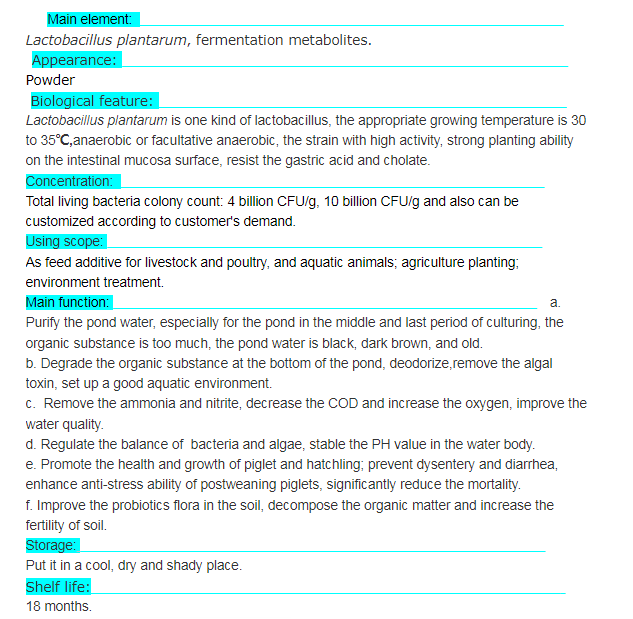
Email: sdraytan@163.com Tel: 0086-137-3096-1137

Email: sdraytan@163.com Tel: 0086-137-3096-1137
It can degrade harmful substances such as ammonia nitrogen and nitrite in the water body, reduce the organic oxygen consumption, indirectly increase the dissolved oxygen content in the water, and improve the water quality. In the middle and late stages of breeding, it can effectively inhibit the rotting of feces and uneaten feed at the bottom, maintaining a good water environment.
Lactobacillus plantarum is a Gram-positive bacterium, belonging to the Lactobacillaceae family and the Lactobacillus genus. It has multiple functions and is widely applied in different fields. The details are as follows:
Health Benefits: It has an immunomodulatory effect, which can enhance the human body's immunity and help the body resist the invasion of foreign pathogens. It can also inhibit pathogenic bacteria in the intestines, maintain the balance of the intestinal flora, and reduce the occurrence of intestinal diseases. It is helpful in reducing the serum cholesterol level, which is beneficial for preventing cardiovascular diseases. Additionally, it can relieve lactose intolerance and help the human body better digest dairy products.
Adjunctive Treatment: It has an adjunctive treatment effect on some intestinal-related diseases. For example, it can reduce the related symptoms of irritable bowel syndrome and Crohn's disease, and help relieve colitis, etc. After using antibiotics, taking Lactobacillus plantarum can help prevent yeast infections.
Aquaculture:
Improving Water Quality: It can degrade harmful substances such as ammonia nitrogen and nitrite in the water body, reduce the organic oxygen consumption, indirectly increase the dissolved oxygen content in the water, and improve the water quality. In the middle and late stages of breeding, it can effectively inhibit the rotting of feces and uneaten feed at the bottom, maintaining a good water environment.
Enhancing Immunity: It can enhance the immunity and anti-stress ability of aquatic animals, improve the survival rate and growth rate of aquatic animals. For example, in the breeding experiments of Carassius auratus var. Pengze and Litopenaeus vannamei and other aquatic animals, good results have been achieved by adding Lactobacillus plantarum.
Livestock and Poultry Breeding:
Promoting Growth: It can secrete substances such as digestive enzymes, small peptides, and vitamins, improve the utilization rate of feed, promote the growth and development of livestock and poultry, and increase the daily weight gain and feed conversion rate.
Preventing Diseases: It can prevent diseases such as yellow and white dysentery and diarrhea of livestock and poultry, reduce the use of antibiotics, and reduce the antibiotic residues in livestock and poultry products. Meanwhile, it can also improve the imbalance of the gastrointestinal flora after antibiotic treatment and quickly restore the gastrointestinal motility.
Fermented Foods: Lactobacillus plantarum is a common starter culture, widely used in the production of fermented foods such as yogurt, sauerkraut, and pickles. It can ferment the sugars in food to produce lactic acid, endowing the food with a unique flavor and taste.
Food Preservation: Since its metabolic products such as lactic acid have a bacteriostatic effect, it can extend the shelf life of food, achieving a natural preservative and fresh-keeping effect.

Contact: Raytan
Phone: 0086-13730961137
Tel: 0086-137-3096-1137
Email: sdraytan@163.com
Add: Langya Port Road, Hi-Tech Development Zone, Qingdao, Shandong Province
We chat